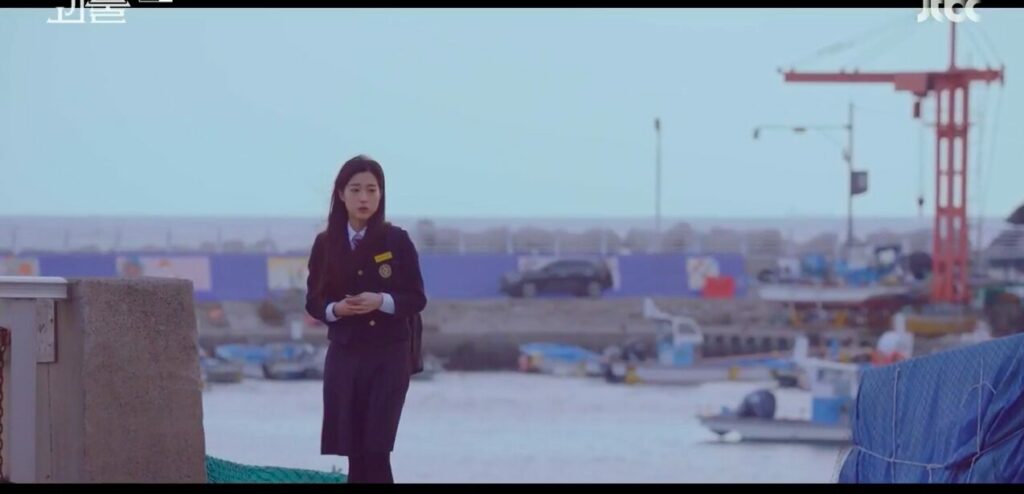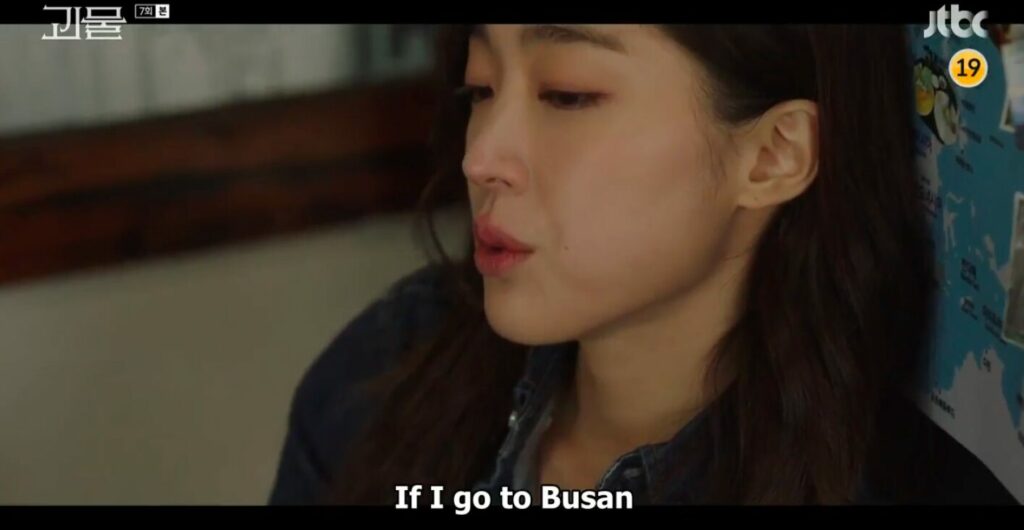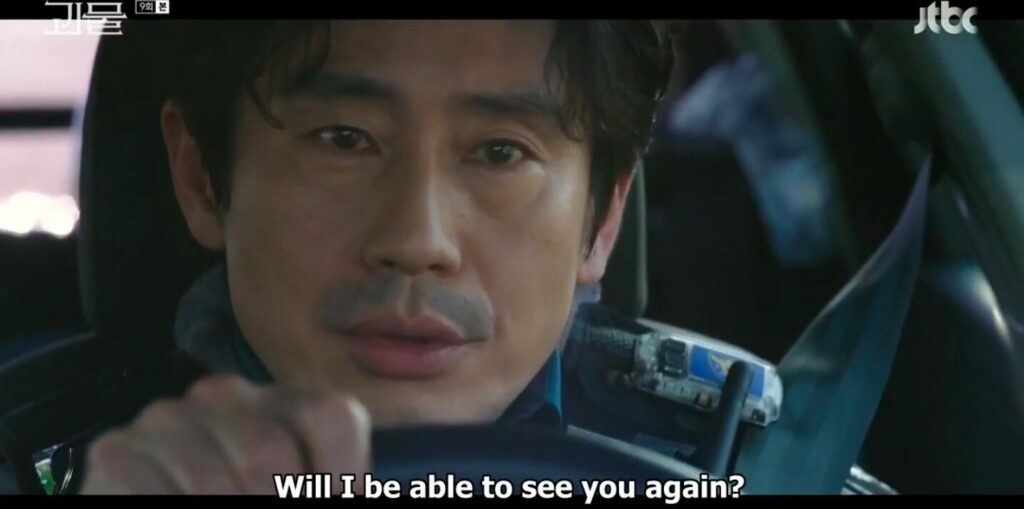If I go to Busan
Will I see you again?
You, who used to greet me
With your pretty hairBusan station
If You Go To Busan – Eco Bridge/Choi baek-ho
It changed so much
Where do I have to go?
You’re not even here anymore

A man with dementia lost in the reed fields: looking for his daughter who will never come home. Another frozen in the winter looking for a child whose fingertips are all he has left. A mother lying in a hospice, broken with the grief of too much loss. And Yoo Jae-yi running off to Busan as the community swirls with rumours about her missing mother.
She ran off with a man. She was seen coming out of a motel in Busan.
There is a schoolgirl in her uniform outside a motel in a sleazy red light district in a seaside town because of the hope – however small, however futile – that her mother might walk out.
But that mother, as one man at least knows, has been buried nearby all along.
One of the most powerful things about the writing in Beyond Evil is the way in which it weaves imagery to produce a consistent emotional impact. The song If You Go To Busan croons beneath the surface; a subtle note underneath everything that happens.
The song tells a tale of longing, of yearning and nostalgia but also of a person who’s broken. One who repeats, almost compulsively, behaviours they hope will lead to a resolution that is never possible.
And everyone, at one point, keeps on going back to Busan. But the person they want to find is never there.


Jae-yi runs to Busan with every rumour, knowing that she will not find her mother there but nonetheless driven by a need to do something. Like the families in Japan searching the ocean and making lunch boxes they float on currents to nowhere.
Dong-shik grimly, methodically, almost crazedly goes about his daily routine. Old men wander reed fields and freeze to death in the streets. Jeong-jae pathologically paints fawns while hiding in his evidence room.
To say it’s grief is to understate the purgatory all the characters live in. A purgatory that comes from the not knowing, the endless waiting, the impotent pacing of life marching on but never lived. Whether your destination is heaven or hell, at least it would be better than the frenetic pointless action of the in-between.
In the case of our murderer, Kang Jin-mook, his pathological trips to Busan give the song’s themes almost a sense of menace; the air of a person who’s broken beyond repair. One who enjoys inflicting that brokenness upon others.
For the other characters, it’s an act of grief or homage or even salvation. For Jin-mook it’s an act of grim stalking. Suddenly the crooning underbelly of the show’s soundtrack tells a completely different story. One where the singer’s endless repeating trip to Busan in search of someone is not a tragic love song or a bittersweet detour into nostalgia but instead a prelude to a violent act of possession.
As Beyond Evil moves into its back half, we see once again the purgatory of repetition that is daily life for a person living in the limbo of the unknowing. Everything has changed. Nothing has changed. Busan is not just a physical place. It’s the past and the desire to return things to where they should be. Not so much revenge or justice or even retribution. More like restitution. Things back to how they used to be, to how they’re supposed to be. In the case of Jin-mook, it’s a restitution that’s violent and self-serving. In the case of Dong-shik, it’s a restitution worth pursuing no matter what the cost. For Joo-won, it’s a restitution that’s increasingly sacrificial as he tries to make sure nobody else but himself gets hurt.
Should you go to Busan? Maybe then you can see them again? Where would you even start looking?
They’re not there anymore.




Thank you so very much 💜💜
“purgatory of repetition that is daily life for a person living in the limbo of the…”
One can live/complete the phrase in numerous ways simply by taking care of a loved one fading through old age’s infirmities amplified by Alzheimer’s. The train doesn’t leave the station as a train, it goes by the smallest bits – a nut here, a bolt there, a paint chip … one goes through the repetitive actions of care giving, to pay attention to stories heard numerous times, because she’s still THERE. Except the stories keep changing, a little bit here, a little bit there, and since one is paying attention, the little pauses, the little side glances as her mind tries to fill in the missing bolt, nut, paint chip, whatever, are seen and heard and one KNOWS a little more has left the station.
Restitution? No. Also not possible in this case. When I first read this essay and the previous one mentioning the stories from Japan, I wondered perhaps, Atonement? For sins of commission, or maybe, omission? Omission, I thought. In life, one of the easiest things to do is to say “yes, I’ll get to that, but not now.” For some of us, the next now is never ever going to be here. Then what? Ah, the purgatory of repetition, of caring and giving while time remains! Except that the most recent memories, one’s acts of atonement are the first to go, and what remains are the sins of omission.
And one grows in understanding in this purgatory. Understanding of the meaning of those “not now”, grows and grows and … purgatory is the right word, the correct concept. So in yet another repetitive act of …, one gives care and attention and dread the inevitable departure of yet another recognizable and remembered bit of her
It’s funny – and I know this is a thread about Beyond Evil – but your comment reminded me of Navillera. I wondered if you’d been watching that as well? It’s a beautiful, bittersweet drama and definitely worth it. But your comment could have applied to that as well.
Yes, watched, and enjoyed it tremendously! I’m not much for tears, but Navillera did squeeze some out of me.